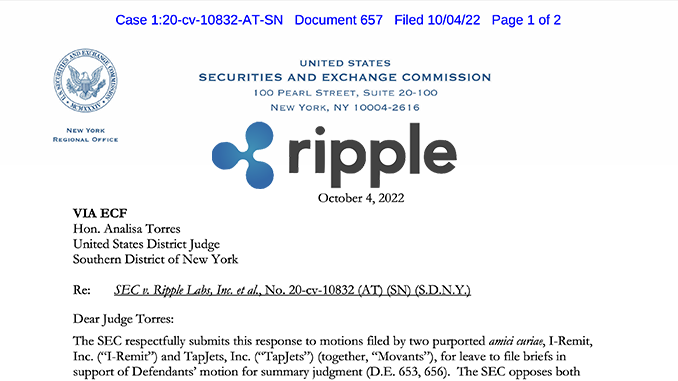
The U.S. Securities and Exchange Commission (SEC) and Ripple (XRP) are moving to a sidebar in their lawsuit. The SEC is now seeking to have third parties who have newly filed excluded.
From the outside looking in, the lawsuit between the U.S. Securities and Exchange Commission (SEC) and Ripple over XRP is shaping up to be a never-ending story. In December 2020, the SEC sued Ripple and 22 months later there is still no end in sight. The latest example: with the payment service provider I-Remit and the flight service Tapjets, two companies have newly registered to take a stand as so-called “amicus curiae” (Latin: “friend of the court”). This is because U.S. law allows third parties to seek leave to file lawsuits if they believe their interests are affected in an ongoing proceeding.
I-Remit has indicated it wants to present evidence that XRP is being used as a bridge currency in its industry. Tapjets, on the other hand, wants to present how and why it accepts XRP as a means of payment. Both companies thus indirectly support Ripple’s line of defining XRP as a cryptocurrency in practical use, thus differentiating XRP from securities (“securities”) and speculative investments. Now the SEC has responded by asking the court not to admit either I-Remit or Tapjets as “amicus curiae.” First, the applications came too late, and second, Ripple’s influence on the companies was possible, according to the SEC’s reasoning.
Ripple immediately denied the allegations, as documented by process observer James Filan on Twitter. It has no closer ties with the companies named, and U.S. legal practice normally allows for late filings for “amicus curiae,” Ripple’s lawyers wrote. The SEC should rather take a look at its own nose and consider why such use cases were not examined themselves for the relief of XRP, they say quite blatantly. Now the court in New York must decide how to deal with I-Remit and Tapjets. In September, it had accepted the US blockchain association Chamber of Digital Commerce (CDC) as “amicus curiae”.
Bottom line: another perceived stage victory for Ripple vs. SEC
The SEC is presenting an increasingly tarnished picture in the lawsuit against Ripple; for months, the agency’s lawyers have been stiffening on delaying tactics, including with regard to the “Hinman speech” that has become famous. The pro-XRP arguments of I-Remit and Tapjets are arguably not relevant to the final ruling, as the special amicus curiae status requested already indicates. But the SEC is acting less than sovereignly if it simply wants to let third parties shut up. At least morally, Ripple can therefore chalk up the current situation as a point win.

Leave a Reply